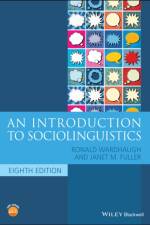av Ronald (University of Toronto) Wardhaugh
565
AN INTRODUCTION TO SOCIOLINGUISTICSThe new eighth edition of An Introduction to Sociolinguistics brings this valuable, bestselling textbook up to date with the latest in sociolinguistic research and pedagogy, providing a broad overview of the study of language in social context with accessible coverage of major concepts, theories, methods, issues, and debates within the field. This leading text helps students develop a critical perspective on language in society as they explore the complex connections between societal norms and language use. The eighth edition contains new and updated coverage of such topics as the societal aspects of African American Vernacular English (AAVE), multilingual societies and discourse, gender and sexuality, ideologies and language attitudes, and the social meanings of linguistic forms.Organized in four sections, this text first covers traditional language issues such as the distinction between languages and dialects, identification of regional and social variation within languages, and the role of context in language use and interpretation. Subsequent chapters cover approaches to research in sociolinguistics--variationist sociolinguistics, ethnography, and discourse analytic research--and address both macro- and micro-sociolinguistic aspects of multilingualism in national, transnational, global, and digital contexts. The concluding section of the text looks at language in relation to gender and sexuality, education, and language planning and policy issues. Featuring examples from a variety of languages and cultures that illustrate topics such as social and regional dialects, multilingualism, and the linguistic construction of identity, this text provides perspectives on both new and foundational research in sociolinguistics and linguistic anthropology.An Introduction to Sociolinguistics, Eighth Edition, remains the ideal textbook for upper-level undergraduate and graduate course in sociolinguistics, language and society, linguistic anthropology, applied and theoretical linguistics, and education. The new edition has also been updated to support classroom application with a range of effective pedagogical tools, including end-of-chapter written exercises and an instructor website, as well as materials to support further learning such as reading suggestions, research ideas, and an updated companion student website containing a searchable glossary, a review guide, additional exercises and examples, and links to online resources.

